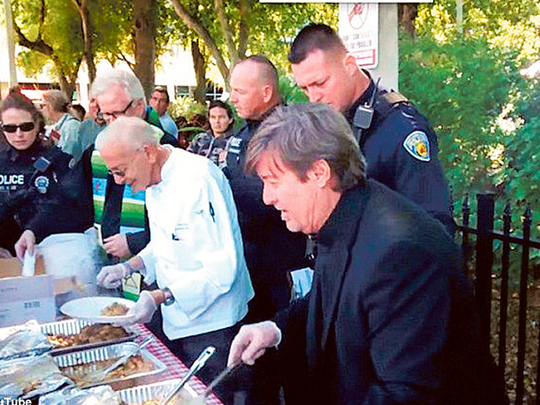
Fort Lauderdale, Florida: A 90-year-old man is facing up to 60 days in jail for feeding the needy due to a new law that bans people here from meal-sharing with the public.
Arnold Abbott risks being fined $500 (Dh1,860) and spending time in prison after police officers apprehended him while he was handing out meals to homeless people in a park on Sunday.
He was arrested and charged along with two ministers from the Sanctuary Church, which prepares hundreds of meals to dish out every week in their kitchen, while onlookers shouted to officers “shame on you!”
Abbott said: “One of police officers came over and said ‘Drop that plate right now,’ as if I was carrying a weapon.”
He added: “These are the poorest of the poor, they have nothing, they don’t have a roof over their heads. How do you turn them away?”
In 1999, Abbott sued the City of Fort Lauderdale after he was banned from feeding the homeless on the beach and the court found that the rule was against the Constitution. The new law — which has come into effect or is planned to in Seattle, Los Angeles, Phoenix, Dallas, and Philadelphia — was passed last week.
Abbott, who describes himself as his “brother’s keeper” who believes “love thy neighbour as thyself”, is planning to sue the city again and intends to continue his good-hearted deeds.
The new regulations require groups to be at least 500 feet (152 metres) away from residential properties and food sites are restricted to one per city block, but charities have criticised the rules as forms of implementing social cleansing.
Michael Stoops, community organiser at the National Coalition for the Homeless, told NBC News: “Economic development and tourism don’t mesh well with homeless folks and the agencies that serve them.”
Abbott set up Love Thy Neighbour in memory of his late wife Maureen in order to continue the humanitarian work they both did by regularly making and sharing food at Holiday Park and Fort Lauderdale Beach.
Fort Lauderdale in late October approved restrictions overnight on churches and other charitable organisations that feed the homeless, becoming the latest city to impose limits on meals offered by private groups in public places.
It’s the fourth law Fort Lauderdale has passed this year concerning the homeless, according to the Sun Sentinel. The others ban the homeless from asking for money at busy intersections, and make it illegal to sleep and store belongings on public property.
Across the US, legislative action criminalising the distribution of food to homeless people is picking up speed. More than 30 cities have passed or are considering such bans; of those, more than 20 have restricted food-sharing since January 2013 alone, according to a study published earlier this week by the Washington-based National Coalition for the Homeless.
Advocates of the legislation say allowing ministries and others to hand out meals aggravates homelessness because it lures homeless people away from city-run programmes.
“Economic development and tourism don’t mesh well with homeless folks and the agencies that serve them,” Stoops said. “That’s happening throughout the country and there are always efforts to try to get the shelters to move to the other side of town. But even if they did that, there would still be homeless folks in the downtown areas, because many of the government agencies, social security, welfare, food stamps, are located in the downtown areas.”
Many of the cities that have attempted to restrict, ban or relocate food-sharing are clustered in Florida and southern California — places that may be more attractive to the homeless because of warm weather, according to Robert Marbut, a national homeless expert and consultant.
“Homelessness is a very complex issue that’s very much intertwined with mental health and substance abuse, largely, and to some extent, job readiness, being able to hold a job. That’s why these things simply don’t work.”
“Because we’ve had two really bad winters in a row, a lot of people move back and forth, but these last two years people moved to southern California, south Texas, and all over Florida. They moved south and did not go back. So Florida has about 10 per cent more homeless in the last twelve months than it did in the prior twelve months, statewide,” he said.
But preventing private groups from feeding homeless people in public is just a “gimmick” that doesn’t address the root causes of homelessness, Marbut, who has worked with dozens of cities to address homelessness, said.
“Homelessness is a very complex issue that’s very much intertwined with mental health and substance abuse, largely, and to some extent job readiness, being able to hold a job. That’s why these things simply don’t work.”
Commissioners in Fort Lauderdale who passed the law were commended by Ron Book, a city lobbyist.
“Feeding people on the streets is sanctioning homelessness,” Book told the commissioners, the Sun Sentinel reported. “Whatever discourages feeding people on the streets is a positive thing.”
Marbut conceded that “feeding keeps people from going into recovery,” but he said that neither giving food to a person on a park bench nor laws that ban the practice are solutions to the problem.
“Street-feeding is bad and it’s wrong, but the best way to do it is to encourage street-feeders to change their location and their time to align with holistic services, rather than trying to outlaw them,” he said. He suggested churches and charities be permitted to move their meal programs to shelters or other places that addresses mental health issues and substance abuse, instead of just imposing restrictions on them.












